“Drugs and alcohol and ego clashes got in the way, but we managed to keep them quiet”: the unbelievable story of Chicago, the soft rock kings with steel in their hearts
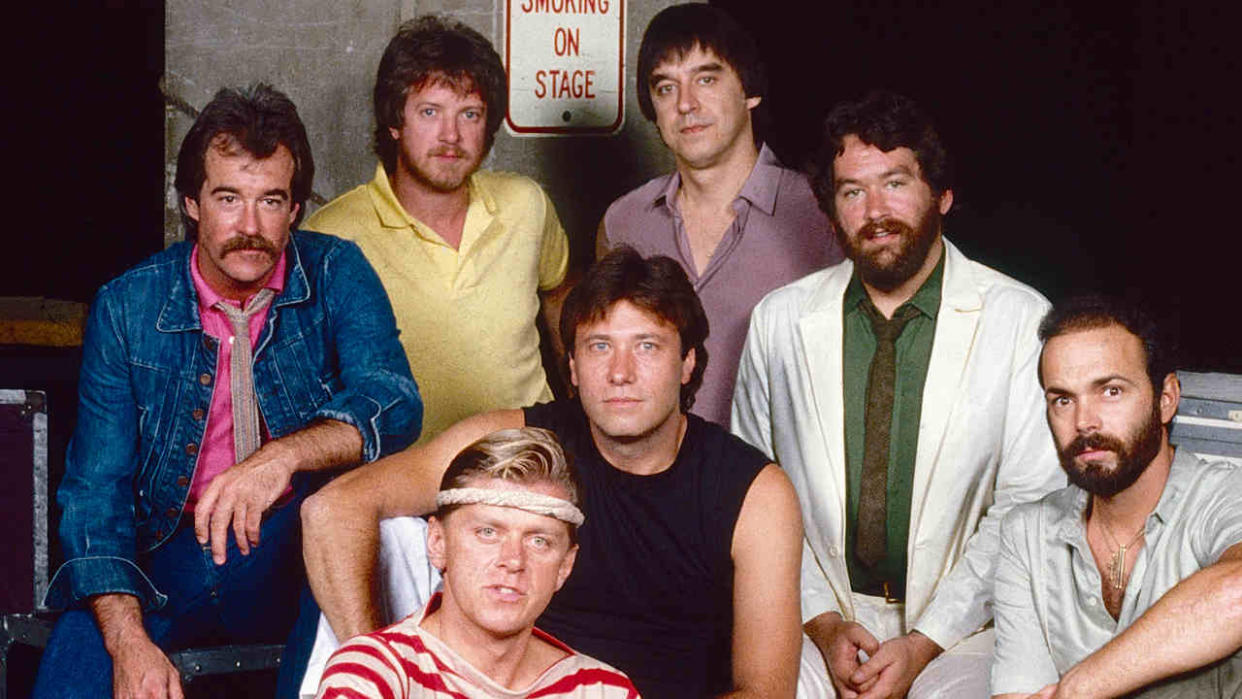
When Peter Cetera was beaten up at a baseball game, it changed his life. In a good way.
Although he left Chicago, the band he co-founded in 1967, almost 40 years ago, to many people Cetera remains the voice of the band, his falsetto technique gracing mega-hits such as If You Leave Me Now and Hard To Say I’m Sorry. Bizarrely, Cetera’s style is a direct a result of singing for a period of time with a wired-shut jaw after getting into a brawl at an LA Dodgers match in summer 1969.
“That’s true,” he affirms. “Three huge guys beat the living shit out of me. They didn’t like a long-haired rock ’n’ roller in a baseball park. I got a broken jaw in three places, and I was in intensive care for a couple of days. Afterwards I was afraid to open my mouth fully. I actually went on the road, and I was singing through my clenched jaw, which, to this day, is still the way I sing.”
The tale of Chicago is a saga of spectacular triumph and heartbreaking tragedy, also in a less obvious sense of management manipulation and deep-rooted internal frustrations. The stats speak for themselves – with record sales of 100 million including 21 US Top Ten singles, five consecutive chart-topping albums and 11 Number One singles, 25 of the group’s 32 albums have been certified platinum.
And yet despite being among the most commercially successful acts in musical history, Chicago are also critically reviled; often dismissed as a soulless, ruthlessly predictable, ballad-obsessed money-making machine when, in fact, they have played many different types of rock music and undergone several evolutions since forming in 1967.
Indeed, it speaks volumes of the way that Chicago are perceived that after more than four decades since the senseless death of Terry Kath – the band’s co-founding guitarist who died from an unintentional self-inflicted gunshot wound – some still claim that the group should have done the decent thing and called it a day.
Had Chicago done so, the world would have been deprived of an artistic and commercial rebirth during the early 1980s that was crowned by the melodic, multi-million-selling masterpieces Chicago 16 and Chicago 17 – albums that gave the world such lip-quivering delights as Hard To Say I’m Sorry, Hard Habit To Break and You’re The Inspiration.
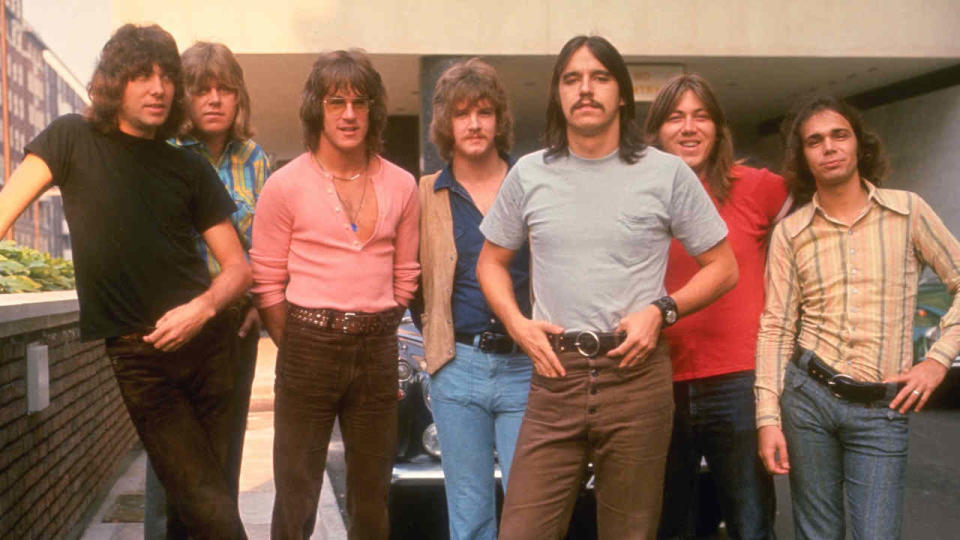
The Chicago story begins when six musicians known as The Big Thing – guitarist/vocalist Terry Kath, saxophonist Walter Parazaider, trumpet player Lee Loughnane, trombonist James Pankow, keyboard player/vocalist Robert Lamm and drummer Danny Seraphine – began combining rock ‘n’ roll with a horn section. Whether they or Blood Sweat & Tears were the first act to do so can be debated, however their ‘new’ sound made them a hot property on the Midwest club circuit.
“Not only were we kids back then but most of the band was studying music,” recalls Robert Lamm now. “Our three-piece horn section definitely gave us an advantage over our rivals.”
However, The Big Thing lacked a strong tenor voice and a bass player. “For our first year, I played bass pedals on the organ,” Lamm reveals. “Terry and I had the vocal ranges to cover most but not all of the Top 40 hits that we performed.”
Peter Cetera of another local act called The Exceptions was to provide the final crucial element of what became Chicago’s signature sound.
In 1968, The Big Thing changed their name Chicago Transit Authority, relocated to Los Angeles and signed to Columbia Records. Produced by Jim Guercio, who doubled as the group’s manager, the following year’s self-titled debut was a double-disc set. Despite its jazzy and experimental qualities, it sold well.
“We were lucky to have formed in an era when people wanted to hear something a little different,” reflects Lamm.
“Chicago started out as an experimental band and in many ways we remain one,” Lee Loughnane agrees. “All that later changed were the economics of the business to which we, like all other bands, had to respond.”
Right from the start, however, Peter Cetera felt like a fish out of water. “Musically, the jazz and blues that the rest of the guys loved was never my cup of tea,” admits the singer, whose taste lay in more mainstream areas. “In a way I never really felt part of the group anyhow.”
Coming from the writer of many of the band’s signature hits, this is a serious admission. “I was afraid of being out of work,” reasons Cetera. “It was like a job to me. I had to put up with some stuff I didn’t like in order to do some stuff I did like.”
Following the release of The Chicago Transit Authority, the band abbreviated their name to the more succinct version that is now so familiar, having been threatened with a writ by the real CTA.
“That’s true,” confirms Loughnane, “but the real reason that we changed it was to avoid confusion. We were being called by three different names; Chicago Transit Authority, CTA and Chicago. So we eliminated the other two.”
In what was either a clever marketing move or a prime shoot-yourself-in-the-foot moment, the band would eventually title most of their ensuing albums as Chicago followed by a Roman numeral. Coupled with the fact that their sleeves stubbornly refused to show the band’s photographs this was certainly consistent in a branding sense, though it also perhaps subliminally bred the suggestion that each successive release sprang from some production line.
“Well, I see the point that you are making,” ponders Loughnane wearily, “but the reality behind that statement couldn’t be any more false. Listen to those records and there’s no mistaking the passion, commitment and artistry that went into making them. That’s complete crap.”
There was nevertheless a political undercurrent to the band’s earliest music, the artwork of 1971’s Chicago At Carnegie Hall extolling the virtues of the era’s youth grappling with the authorities to change the system. “What with Vietnam and civil rights issues, America was crazy back then,” explains Lamm. “A changing of the guard was about to happen, something that was enrooted in our DNA.”
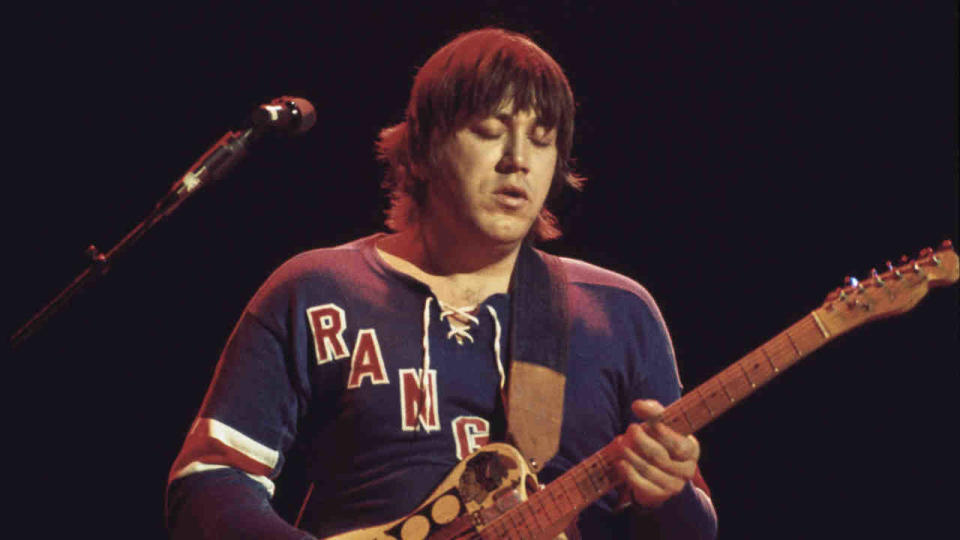
Although their enviable early sales figures suggest otherwise, Robert Lamm believes that it took the band five albums to establish its real musical voice, a claim perhaps verified in the summer of 1972 when Chicago 5 became the group’s first US Number One LP, remaining in its lofty position for five weeks.
“Becoming huge stars at such a young age was challenging, I don’t think anyone can be prepared for that until it happens,” Lamm remembers. “When it did so, we closed ranks and almost sort of took it in turns to parent each other as things got out of control. It was euphoric on some levels and heartbreaking on others.”
“Drugs and alcohol and ego clashes got in the way,” shrugs Cetera now. “We could compete with many other bands in those respects, but we managed to keep them private.”
Indeed, thanks to the fact that their famous logo and not the musicians’ faces appeared on the record sleeves, Chicago enjoyed anonymity on a grander scale.
“It still helps to keep us sane today,” chuckles Loughnane. “I’m doing an interview [by phone] with you right now, but if I were to walk past you later I doubt that you could picture my face.”
Peter Cetera offers a more sinister viewpoint, suggesting that manager Jim Guercio used the fact that nobody really knew what Chicago really looked like as reminder that nobody in the band was irreplaceable.
“It’s another reason why the band kept their mouths shut about so many things,” he points out. Chicago’s inner workings were certainly complex. With so many singers and writers trying to exert their influences upon Chicago’s music, things weren’t always harmonious.
“We tried to be fairly civil about the breakdown of what was and wasn’t included on our albums, especially early on,” reflects Lamm. “But everything changed after the tenth album. Once the song If You Leave Me Now showed up in our lives, the band stopped making musical statements and documenting where we were as composers. It began to be more premeditated. We were gunslingers; people wanted hits. Suddenly, everyone in the band expected to be a writer, when at the start there was only Terry Kath, James Pankow and myself.”
“Those guys didn’t want to give up a share of anything,” comments Peter Cetera, who had sung the band’s first hit, the Lamm-penned 25 Or 6 To 4, but couldn’t force his way into the creative team until Chicago VI in 1973.
It would take four more years before If You Leave Me Now, written and sung by Cetera, transformed Chicago into genuine worldwide superstars. Their first US Number One single, it also topped the British and Australian singles charts, bringing the band two prestigious Grammy awards.
It’s staggering to think that, just like many career-defining hits by other acts born as virtual after-thoughts, If You Leave Me Now was recorded at the last minute and almost didn’t make it on to Chicago X.
“That’s because if you listened to the previous nine Chicago albums you wouldn’t have heard anything similar. It didn’t show the band as we thought we were,” explains Lamm, “nor indeed in its best light. When it became as successful as it did, everybody was surprised. Some of us resented it because… well, because it just wasn’t cool – certainly it was beautiful, but in our young minds it just wasn’t a cool song.”
As a consequence of the If You Leave Me Now phenomenon the band’s record company, along with the general public, came to view Chicago as a ‘ballad band’.
“It was decided for us that ballads were our niche,” rues Loughnane. “Yes, we can play ballads and play them well, but we can also play anything we like. And that’s what we still do.”
Chicago came to not one but two forks in the road circa 1977’s Chicago XI album. During its recording they decided they could no longer cope with the demands of their producer/manager Jim Guercio, and sacked him upon its completion. More importantly still, mere months after Chicago XI’s unveiling, Terry Kath unintentionally shot himself during a party at the house of band roadie, Don Johnson.
“Terry had been thinking of leaving the group and gone off on a bender. He’d been up for three days taking coke and all that stuff,” remembers Cetera. “When I heard the news I figured I’d probably have to start my own group.”
“It was the only time that we seriously considered breaking up,” states Loughnane. “Those feelings were intense, but short-lived – it was only a week or two before we realised that Terry would not have wanted us to split up. The band still wanted to play; the biggest problem was replacing the magic that Terry, who was our musical leader, brought to the band.”
“Had Terry survived and been a part of Chicago as it went into the 1980s, this band’s history would have been very different,” ventures Robert Lamm. “Terry would have would have opposed the balladic direction that we were sucked into. He’d put a stop to that, or he’d have left the band.”
With new guitarist Donnie Dacus in place, Chicago rang further changes with their 12th album, Hot Streets, in 1978. Co-produced by the group with Phil Ramone, it was their first collection of all-new material to feature a non-numeric title, also to show the band on its cover (though they had been pictured breaking through their now-fabled logo on Chicago’s Greatest Hits three years earlier).
“We were moving into a different era,” observes Loughnane, “but people still wanted to have the numbers [instead of titles]. So we went back to that.”
In fact, despite selling a million copies, Hot Streets was the band’s first record since their debut to fall short of the US Top Ten, by two places. The following year’s Chicago 13 would peak at Number 21, the poorly promoted Chicago XIV stalling at Number 71.
Dropped by Columbia in 1981, Chicago entered a period of stagnation before hooking up with Full Moon Records and a fellow musician whose production and guidance skills would help to take their career to unprecedented new heights.
“David Foster was still an untried producer, but he had a vision of how the band should sound,” explains Loughnane. “He chose [to highlight] the tenor voice [of Peter Cetera], and the results speak for themselves.”
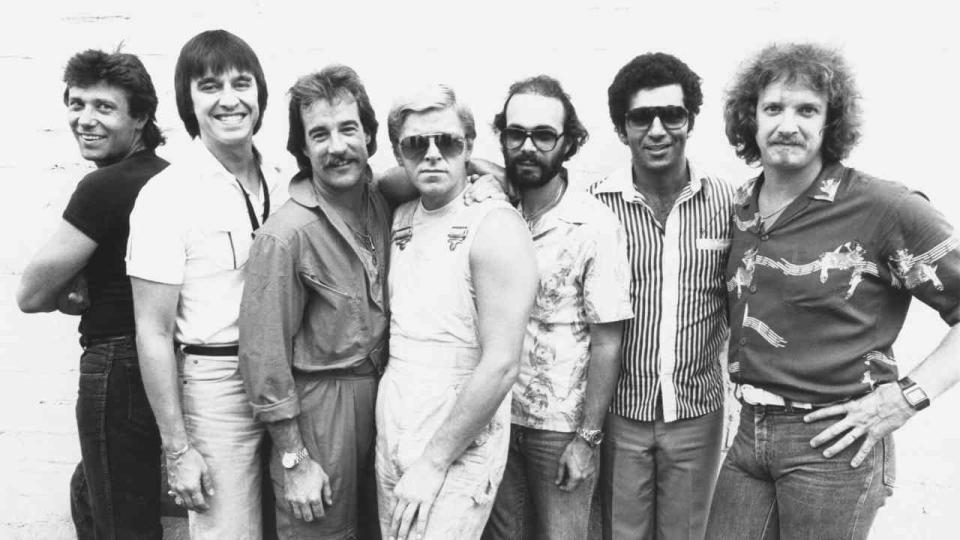
Having resolved his own chemical and booze issues, Cetera comes clean about his personal goals. “I thought that if I could get Chicago back on its feet, then it would be easier for me to walk away from,” he confides.
Due in no small part to the band’s second US Number One single, Hard To Say I’m Sorry, 1982’s Chicago 16 has now sold more than three million copies. It features contributions from Toto’s Steve Lukather, Joseph Williams, David Paich and Steve Porcaro.
Two years later, Chicago 17 begat four Top 20 US hit singles including Hard Habit To Break and You’re The Inspiration, establishing itself as the band’s biggest all-time seller (it’s now owned by seven million people). And yet for all of the career regeneration that it brought Chicago, Robert Lamm doesn’t look favourably upon the David Foster-influenced era of the band’s history.
“Foster was talented but he was also smarmy. He bought into the whole ballad thing. Once Cetera had started [taking over the] writing and Foster was on board, then all those outsiders started affecting what we were doing,” he says, irked by writing credits for the likes of Foster, Ian Thomas, Toto’s Williams and Paich and even Lionel Richie that began appearing in the small print. Intriguingly, Donny Osmond and a young Richard Marx were among the backing vocalists to appear on Chicago 17.
Cetera addresses the issue of the guest writers and players with his usual candour; “What the other guys are not telling you is that by that point the drugs and the drinking had taken over so much, along with David [Foster] I was the only one that still could write. Except Danny [Seraphine] they were all doing that stuff. I dare anybody to try to deny that it was a very dysfunctional time.”
“From the first day that we got together, Chicago was a team effort,” says Lee Loughnane in response to the above claim. “We were, in every sense of the word, a ‘group’. Robert Lamm, James Pankow and Terry Kath were the major songwriters in the beginning. Then Peter Cetera, Danny Seraphine and myself.
“As we became more and more successful, we all had missteps with drugs, booze and women. One or more of us always stepped up and worked harder and contributed more when the extra effort was needed.”
That wasn’t enough to persuade Cetera to stay. In 1985, he severed his ties with Chicago and became a solo artist. Warned by the group’s organisation that an annual tour of North America was imminent, Cetera dug in his heels and insisted upon recording a second solo album instead.
“Were we disappointed that Peter felt it was more important to do his own thing than to stay with Chicago? Of course we were,” responds Robert Lamm. “But it’s happened so many times before. Whoever starts to believe that he is that band’s ‘main guy’ in a band – the reason for their success – usually wants to work outside that community.”
In fact, Cetera claims that he had already cut an “under the table” deal with Chicago’s management that would have brought him extra royalties before the ‘tour or quit’ ultimatum arrived.
“They were going to give me extra ‘points’ [percentage of the profits], which I felt I deserved, but management said: ‘Don’t tell the group’ – that’s how things were back then,” he exclaims. “So I replied: ‘I won’t say shit’.”
But still Peter prioritised a solo album above touring. When a contract arrived and he prevaricated Cetera was told: “If you don’t sign they’ll find someone else.”
“So I rang the manager and said: ‘You can tell them to start looking’. It was a relief, to be honest,” he relates.
Jason Scheff, son of Elvis Presley’s bassist Jerry Scheff, became the band’s new bassist/singer in time for a final David Foster-produced album, Chicago 18. This was less successful than its two predecessors, but Scheff remained with the band until 2016. However, while Chicago remained a popular live draw their profile dipped immensely during the 1990s and beyond.
“It was inevitable,” Lamm theorises. “Each generation has a changing of the guard taste-wise, and the advent of things like grunge affected us. Not to mention the many, many bad decisions the record companies made.”
This category must include the vetoing of the group’s Stone Of Sisyphus album by Warner Bros (the parent company of Full Moon) back in 1994. Though deemed “unreleasable” at the time, the recordings would emerge under the title of Chicago XXXII: Stone Of Sisyphus some 15 years later.
“We always knew that it was a good record,” professes Loughnane. “Warner Bros told us we had to go back in and record some hits, but they were going through their own period of transition. It was a business decision, not a musical one.”
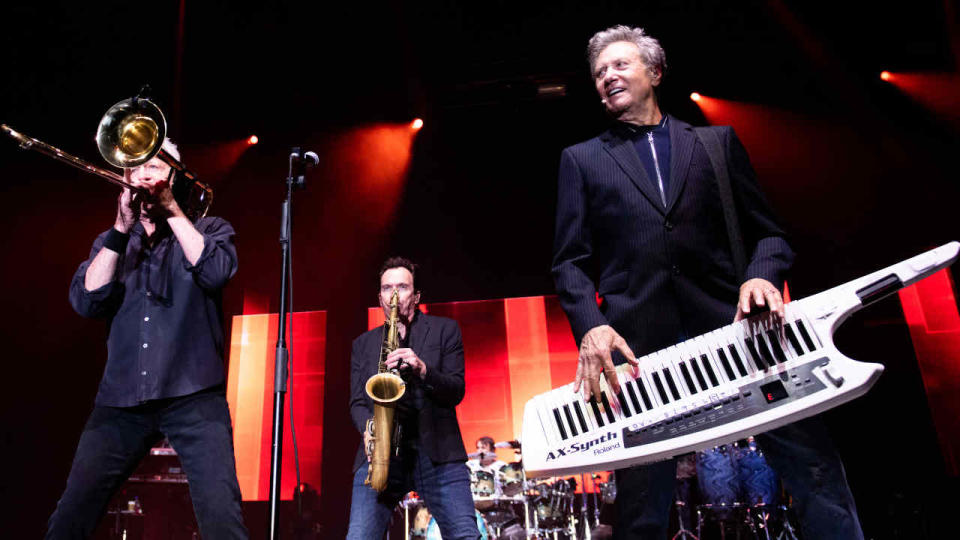
Unlike so many of their contemporaries, Chicago never broke up or went on hiatus and continue to tour regularly.
“I’m proud and happy that we do – and that we still perform very well,” Lamm bristles. “We still make records, too. As someone that began composing in the late 1960s, that brings me comfort” (Chicago release their third seasonal album, O Christmas Three, later this year).
Lamm and Loughnane both agree that the David Foster years have left Chicago misunderstood. Pigeonholed in the narrowest of musical terms as some redundant soft-rock behemoth, they receive little credit for the breadth and quality of an extensive catalogue.
“There’s very little we can do about that,” Loughnane sighs. “All that radio has ever wanted to hear from Chicago is another version of If You Leave Me Now. And success like that can never be repeated.”
Naturally there have been countless line-up changes in recent years, though the trio of founder members – Lamm, Loughnane and James Pankow – continue to be the beating heart of the band. Asked whether Peter Cetera might someday return to Chicago, Robert Lamm replies: “No. That would be like remarrying your ex-wife.”
According Cetera the feeling is mutual. “The day that I go back to Chicago is the day you can call me up and say: ‘You sold out’,” he laughs.
Robert Lamm is the first to admit that Chicago’s journey has been a wild ride, with plenty of twists and its fair share of tumult. But he adds that all the turbulence has been worth it.
“People come to see us and say: ‘My God, I know every single one of those songs’,” announces Lamm proudly. “I know that isn’t the case with everybody else. We’ve been privileged to amass a very strong body of work, so why not show it off?”
Originally published in Classic Rock Presents AOR issue 3
